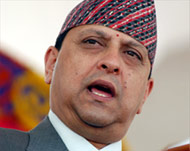Nepal concern for missing troops
Concern has mounted for 60 Nepalese soldiers feared captured by communist rebels as the army recovered the bodies of 40 troops who have been shot in the head execution-style in the fiercest battle of the year.

Parts of their bodies had been cut off, the army said on Wednesday.
Ian Martin of the UN’s Office of the High Commissioner for Human Rights in Nepal urged the rebels to humanely treat the captured soldiers and to respect international human rights laws.
Troops continued to scour the mountainous terrain where an army camp was attacked and overrun by the rebels on Sunday and Monday.
The Royal Nepalese Army said on Wednesday they had regained control of the area, near the village of Tilli, about 550km northwest of the capital, Katmandu.
At least 111 soldiers from the camp have been tracked down, but about 60 are unaccounted for, the army said.
Worst violence
The rebels have acknowledged they lost 26 fighters while 42 more were wounded in the attack.
 |
|
Violence has escalated since King |
The guerrillas have claimed killing 159 soldiers and taking at least 50 more hostage during the attack on the camp.
The rebels have been known to exaggerate such claims in the past, while the army’s accounts have generally been accurate.
It was the worst violence this year between government troops and Maoist rebels, who have been fighting since 1996 for a communist state.
Hundreds of troops backed by helicopter gunships were still combing the region on foot on Wednesday.
The soldiers had been building a road in one of the most impoverished parts of this Himalayan kingdom.
Rebels who claim to be inspired by Chinese communist revolutionary Mao Zedong have been fighting for nine years to topple Nepal’s monarchy.
Violence has escalated since King Gyanendra seized control of the government in February, a measure he said was necessary to quell an insurgency that has left more than 11,500 dead.